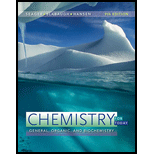
Chemistry for Today: General, Organic, and Biochemistry
9th Edition
ISBN: 9781305960060
Author: Spencer L. Seager, Michael R. Slabaugh, Maren S. Hansen
Publisher: Cengage Learning
expand_more
expand_more
format_list_bulleted
Concept explainers
Question
Chapter 20, Problem 20.38E
Interpretation Introduction
Interpretation:
The three mechanisms for the control of enzyme activity is to be listed.
Concept introduction:
Enzyme activity is the measure of catalytic ability in a
Expert Solution & Answer
Trending nowThis is a popular solution!

Students have asked these similar questions
7
Draw the starting alkyl bromide that would produce this alkyne
under these conditions.
F
Drawing
1. NaNH2, A
2. H3O+
£
4 Temps to rise
Tomorrow
Q Search
H2
7
Comment on the general features of the predicted (extremely simplified) ¹H-
NMR spectrum of lycopene that is provided below.
00
6
57
PPM
3
2
1
0
Indicate the compound formula: dimethyl iodide (propyl) sulfonium.
Chapter 20 Solutions
Chemistry for Today: General, Organic, and Biochemistry
Ch. 20 - What is the role of enzymes in the body?Ch. 20 - List two ways that enzyme catalysis of a reaction...Ch. 20 - What is the relationship between an enzyme and the...Ch. 20 - Why are so many different enzymes needed?Ch. 20 - Define what is meant by the term enzyme...Ch. 20 - Prob. 20.6ECh. 20 - Prob. 20.7ECh. 20 - Prob. 20.8ECh. 20 - What is the relationship between urea and urease?...Ch. 20 - Match the following enzymes and substrates: Enzyme...
Ch. 20 - Match the following general enzyme names and...Ch. 20 - Prob. 20.12ECh. 20 - Some enzymes consist of protein plus another...Ch. 20 - Prob. 20.14ECh. 20 - Prob. 20.15ECh. 20 - Prob. 20.16ECh. 20 - Prob. 20.17ECh. 20 - Prob. 20.18ECh. 20 - Prob. 20.19ECh. 20 - How is enzyme specificity explained by the...Ch. 20 - Prob. 20.21ECh. 20 - Prob. 20.22ECh. 20 - Prob. 20.23ECh. 20 - What observations may be used in experiments to...Ch. 20 - Prob. 20.25ECh. 20 - Prob. 20.26ECh. 20 - Prob. 20.27ECh. 20 - Write a single sentence to summarize the...Ch. 20 - Prob. 20.29ECh. 20 - Prob. 20.30ECh. 20 - Prob. 20.31ECh. 20 - When handling or storing solutions of enzymes, the...Ch. 20 - Prob. 20.33ECh. 20 - Prob. 20.34ECh. 20 - Prob. 20.35ECh. 20 - List an antidote for each of the two poisons in...Ch. 20 - Prob. 20.37ECh. 20 - Prob. 20.38ECh. 20 - Describe the importance of zymogens in the body....Ch. 20 - Prob. 20.40ECh. 20 - Prob. 20.41ECh. 20 - Name and contrast the two types of modulators.Ch. 20 - Prob. 20.43ECh. 20 - Prob. 20.44ECh. 20 - Prob. 20.45ECh. 20 - Prob. 20.46ECh. 20 - Prob. 20.47ECh. 20 - Prob. 20.48ECh. 20 - Prob. 20.49ECh. 20 - Prob. 20.50ECh. 20 - Prob. 20.51ECh. 20 - Prob. 20.52ECh. 20 - Prob. 20.53ECh. 20 - Prob. 20.54ECh. 20 - Explain how the pasteurization of milk utilizes...Ch. 20 - Prob. 20.56ECh. 20 - Prob. 20.57ECh. 20 - Prob. 20.58ECh. 20 - Prob. 20.59ECh. 20 - Why are enzymes that are used for laboratory or...Ch. 20 - Describe the difference between graphs showing...Ch. 20 - Answer the question associated with Figure 20.3....Ch. 20 - Prob. 20.63ECh. 20 - Prob. 20.64ECh. 20 - Prob. 20.65ECh. 20 - Prob. 20.66ECh. 20 - Prob. 20.67ECh. 20 - Which of the following is not a characteristic of...Ch. 20 - The human body has an average pH of about 7 and a...Ch. 20 - Look at Table 20.4 and identify the proteolytic...Ch. 20 - Saliva contains mucus, water, and _______, which...Ch. 20 - Most human enzymes function best in the...Ch. 20 - The site on an enzyme molecule that does the...Ch. 20 - The process by which an enzyme acts on the...Ch. 20 - In the multienzyme sequence shown below, molecules...
Knowledge Booster
Learn more about
Need a deep-dive on the concept behind this application? Look no further. Learn more about this topic, chemistry and related others by exploring similar questions and additional content below.Similar questions
arrow_back_ios
SEE MORE QUESTIONS
arrow_forward_ios
Recommended textbooks for you
 Chemistry for Today: General, Organic, and Bioche...ChemistryISBN:9781305960060Author:Spencer L. Seager, Michael R. Slabaugh, Maren S. HansenPublisher:Cengage Learning
Chemistry for Today: General, Organic, and Bioche...ChemistryISBN:9781305960060Author:Spencer L. Seager, Michael R. Slabaugh, Maren S. HansenPublisher:Cengage Learning World of Chemistry, 3rd editionChemistryISBN:9781133109655Author:Steven S. Zumdahl, Susan L. Zumdahl, Donald J. DeCostePublisher:Brooks / Cole / Cengage Learning
World of Chemistry, 3rd editionChemistryISBN:9781133109655Author:Steven S. Zumdahl, Susan L. Zumdahl, Donald J. DeCostePublisher:Brooks / Cole / Cengage Learning World of ChemistryChemistryISBN:9780618562763Author:Steven S. ZumdahlPublisher:Houghton Mifflin College Div
World of ChemistryChemistryISBN:9780618562763Author:Steven S. ZumdahlPublisher:Houghton Mifflin College Div General, Organic, and Biological ChemistryChemistryISBN:9781285853918Author:H. Stephen StokerPublisher:Cengage Learning
General, Organic, and Biological ChemistryChemistryISBN:9781285853918Author:H. Stephen StokerPublisher:Cengage Learning Organic And Biological ChemistryChemistryISBN:9781305081079Author:STOKER, H. Stephen (howard Stephen)Publisher:Cengage Learning,Chemistry: Matter and ChangeChemistryISBN:9780078746376Author:Dinah Zike, Laurel Dingrando, Nicholas Hainen, Cheryl WistromPublisher:Glencoe/McGraw-Hill School Pub Co
Organic And Biological ChemistryChemistryISBN:9781305081079Author:STOKER, H. Stephen (howard Stephen)Publisher:Cengage Learning,Chemistry: Matter and ChangeChemistryISBN:9780078746376Author:Dinah Zike, Laurel Dingrando, Nicholas Hainen, Cheryl WistromPublisher:Glencoe/McGraw-Hill School Pub Co

Chemistry for Today: General, Organic, and Bioche...
Chemistry
ISBN:9781305960060
Author:Spencer L. Seager, Michael R. Slabaugh, Maren S. Hansen
Publisher:Cengage Learning

World of Chemistry, 3rd edition
Chemistry
ISBN:9781133109655
Author:Steven S. Zumdahl, Susan L. Zumdahl, Donald J. DeCoste
Publisher:Brooks / Cole / Cengage Learning

World of Chemistry
Chemistry
ISBN:9780618562763
Author:Steven S. Zumdahl
Publisher:Houghton Mifflin College Div

General, Organic, and Biological Chemistry
Chemistry
ISBN:9781285853918
Author:H. Stephen Stoker
Publisher:Cengage Learning

Organic And Biological Chemistry
Chemistry
ISBN:9781305081079
Author:STOKER, H. Stephen (howard Stephen)
Publisher:Cengage Learning,

Chemistry: Matter and Change
Chemistry
ISBN:9780078746376
Author:Dinah Zike, Laurel Dingrando, Nicholas Hainen, Cheryl Wistrom
Publisher:Glencoe/McGraw-Hill School Pub Co
Biomolecules - Protein - Amino acids; Author: Tutorials Point (India) Ltd.;https://www.youtube.com/watch?v=ySNVPDHJ0ek;License: Standard YouTube License, CC-BY